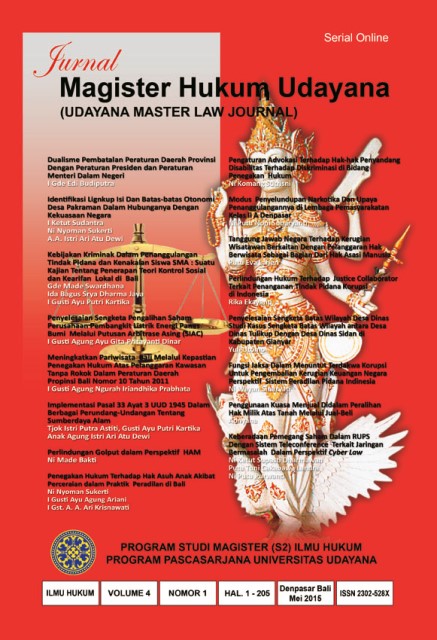KEBIJAKAN KRIMINAL DALAM PENANGGULANGAN TINDAK PIDANA DAN KENAKALAN SISWA SMA : SUATU KAJIAN TENTANG PENERAPAN TEORI KONTROL SOSIAL DAN KEARIFAN LOKAL DI BALI
Abstract
Juvenile delinquency is a symptom of social and has raised concerns among parents in particular and society in general. These forms of behavior such as child delinquency abuse of narcotic and psychotropic drugs, free sex, fights among teenagers of the village, street racing, began to adorn the Balinese order changes gradually. These symptoms seem to always just show itself as an actual problem that is typical in each period of time and therefore be interesting to be examined. Community structure that changes caused by pressure or offered options that ultimately became plural and multicultural Bali. Resolution of the problem certainly must be associated with a Balinese local wisdom itself.
The problem is formulated: (1) why the theory of social control is the most appropriate theory used to cope with children's Misbehavior in Bali?; (2) How the pattern of juvenile delinquency prevention in Bali with the use of local wisdom?
The approach used in this study is the non doctrinal approach (socio-legal approach). In principle the socio-legal study is the study of the law, based on social sciences methodology in the broad sense. This research included in aggregate research tradition between qualitative research and quantitative research is often known for its mix of research, with the perspective approach to Criminology.
(1) the theory of social control, as compared to the theory of social disorganization theories of deviant behavior in criminology, social control theory most appropriate use in tackling child because, while a strong social bonds between the children with peers, peer group, parents, school teachers, community leaders, religious figures, children undoubtedly will not do deviate behavior. Although his theory of social control in the West but its implementation against children in Bali is more focused than the other theories are, of course, the addition of the elements contained in the theory of social control, such as Attachment, Commitment, Involvement, and Belief, is associated with the local wisdom Balinese people strongly support the strengthening of social control theory; (2) the pattern of juvenile delinquency prevention in General to use the model of non-penal and penal. The pattern of non penal in tackling child delinquency through local wisdom like tri hita karana, tri kaya parisudha, tri tat twam asi, and others, the Balinese social control can prevent or cope with a minimum of child delinquency in Bali.
Downloads
Keywords
Jurnal Magister Hukum Udayana (Udayana Master Law of Journal) by Faculty of Law Udayana University is licensed under a Creative Commons Attribution-NonCommercial 4.0 International License.



















